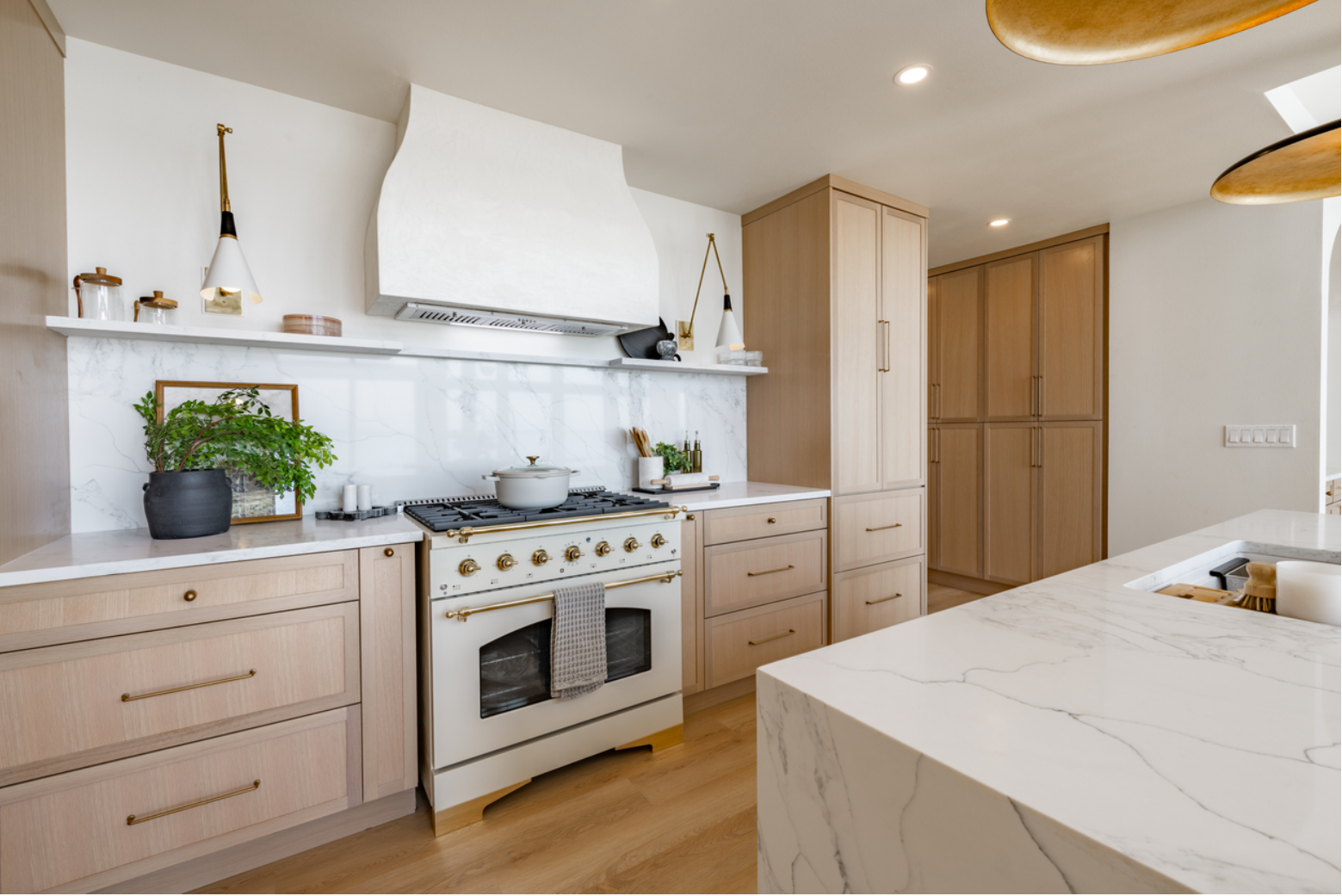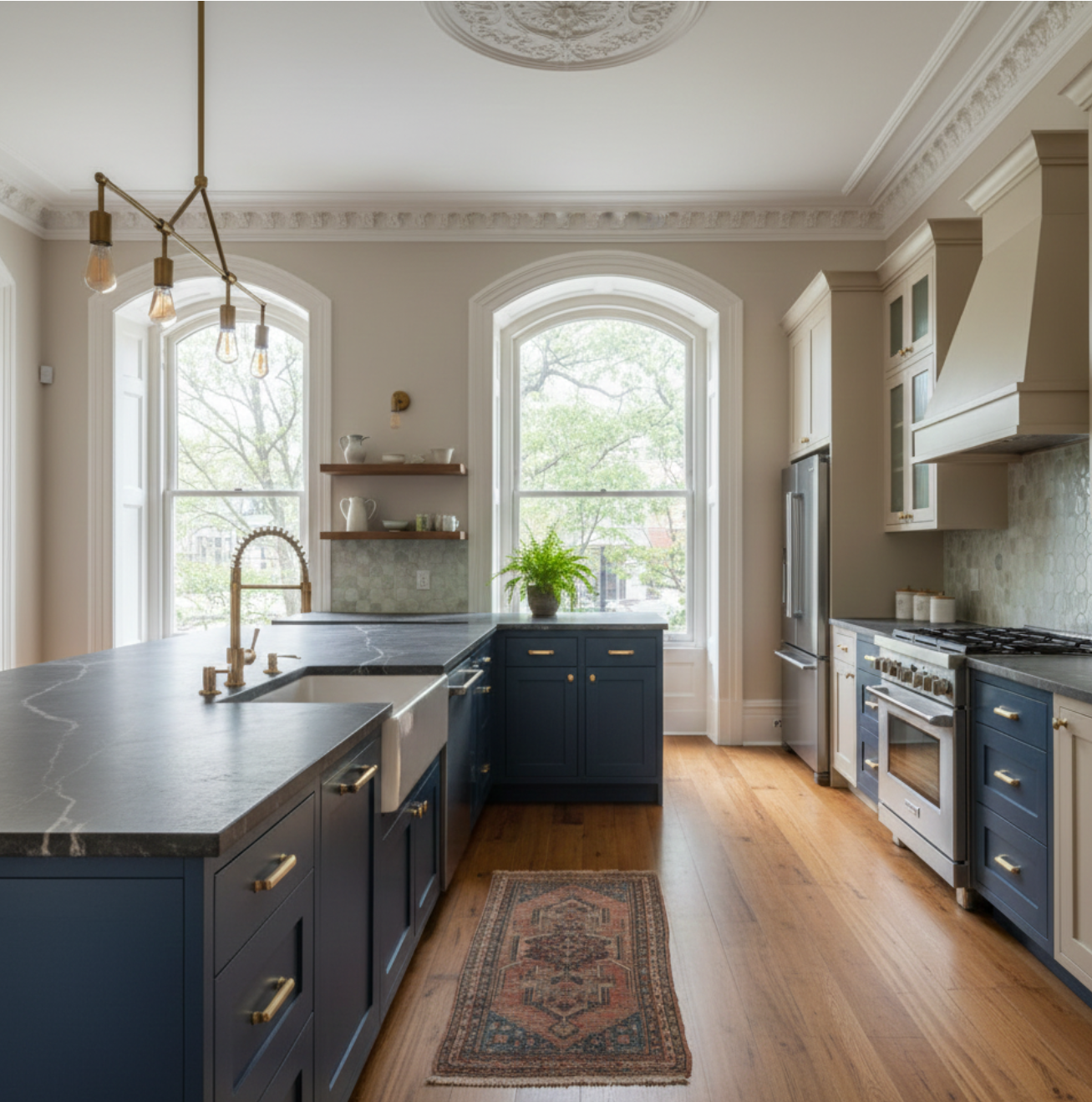
The right kitchen countertops can transform the heart of your home. These are surfaces that you'll use on a daily basis, and you should love how they look and function.
Yet, we know this decision isn't always an easy one. With so many options on the market, it can be hard to know which one will fit your aesthetic and meet your needs.
As Metro Detroit's trusted location for granite, quartz, and marble countertops, we understand how these materials work. Today, we're breaking down the differences between the different products and sharing what you need to know about each one.
Granite countertops are a homeowner favorite and are commonly used in remodels and upgrades. This is a natural stone that's known for its durability and heat resistance. It's also prized for its versatility, with lots of different colors, designs, and patterns to choose from.
Because each slab of granite contains a unique mineral composition, you can rest assured that your countertops won't be a carbon copy of anyone else's. These minerals give granite its trademark fluidity, which adds warmth and movement to your kitchen.
Thinking about installing granite? Here are a few of the benefits you can expect:
Stain-resistant
Scratch-resistant
Tough and durable
Lots of different varieties available, including exotic options
Little maintenance required
Can add resale value to your home
Granite doesn't have too many drawbacks. It's a reliable countertop material that's more than capable of withstanding years of wear and tear. However, it is important to keep in mind that it's a natural, porous material.
In short, this means that liquids can absorb into it if they're left on the surface for a long period of time, which can lead to staining. While most will evaporate without special treatment, you may be able to use a poultice to speed up the process.
Most fabricators recommend sealing granite countertops at least once a year to prevent them from absorbing liquids too quickly. Today, there are some sealants that will last up to 10 years or longer, which greatly reduces your maintenance time and cost.
Other possible issues to consider:
May require a seam (especially in L- or U-shaped layouts)
Cost can vary based on edge profiles, total square footage, thickness, and pattern
Love the durability and reliability of granite, but want something a little less porous? If so, you may want to look into quartz countertops.
While this material is engineered, the quartz within it is natural. During the manufacturing process, natural quartz is ground into fine dust. Then, it's combined with other natural and synthetic materials, including resins, polymers, and pigments.
The resins and polymers bind the quartz together, while the pigments give it color. Quartz countertops can also contain other materials, such as recycled glass or metal flecks, to add character and visual interest.
A natural stone alternative to quartz is quartzite. This material starts out as sandstone; then manufacturers use heat and pressure to fuse it with quartz crystals. Quartzite offers a more natural look and more movement than quartz, including more pronounced veining and patterning.
Quartz has a fresh, uniform appearance that enhances a kitchen and makes it feel clean. Here are some of the other reasons to consider it for your project:
Ultra-durable
Stain-resistant
Elegant and modern appearance
Easy to maintain
Non-porous
Versatile (also looks great in bathrooms, laundry rooms, bars, etc.)
Quartz countertops are a popular choice for homeowners who want to embrace the look of a sleek, elevated interior. However, there are a few factors to consider before investing in this option.
First, quartz tends to be more expensive than granite, though the price will vary based on the type of quartz you choose, as well as the manufacturer, style, and edging design. The trade-off is that you get enhanced durability and even less maintenance with quartz than with granite.
Other potential drawbacks include:
Quartz is customizable, but you don't get the natural movement and veining of granite
Seams can be more noticeable on quartz
Excessive, prolonged heat could damage and discolor the resins
Extremely heavy, so installation can take longer and cost more
Marble countertops are often considered to be the ultimate in kitchen luxury. This material is esthetically beautiful and full of natural veining, movement, and personality. The veins can be dark and dramatic or thin and barely there.
There's a natural elegance to marble, and it's become increasingly popular as a backsplash material, as well.
Could marble be a good fit in your home? Here are the advantages of choosing this material for your new countertops:
Beautiful, classy appearance
Naturally cool surface is ideal for baking
Can add resale value to your home
Unique veining
While marble is distinctly beautiful, it's important to understand what you can expect when you install it in your home. This material is the most porous of the three options, which makes it more vulnerable to staining and discoloration.
You'll need to seal your countertops at least once a year, preferably using a high-grade sealant installed by the manufacturer or an installation specialist. Doing so can help prevent liquids from absorbing into the surface.
Other possible issues include:
Can scratch easily
Can etch if exposed to acidic liquids for a prolonged period of time
Can be more difficult to clean (certain chemical cleaners can damage it)
Usually more expensive than other countertop options
Now that you know more about the different countertop options, are you ready to dive into your project? If so, we'd love to help you create the kitchen of your dreams.
AP Marble & Granite's warehouse contains more than 40,000 square feet of stone, with a wide variety of selections, including granite, quartz, and marble. For more than 20 years, we've been the go-to location for Metro Detroit homeowners, with a reputation for providing quality service, beautiful materials, and expert applications.
Visit us in person or feel free to contact us any time to get started!

Explore upcoming 2026 trends in natural stone countertops for Metro Detroit kitchens, including colors, textures and durable stone options.

Discover the top stone choices for remodeling historic Detroit homes. Learn how to match natural stone with original architecture and period details.